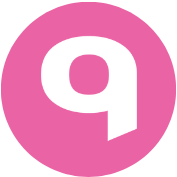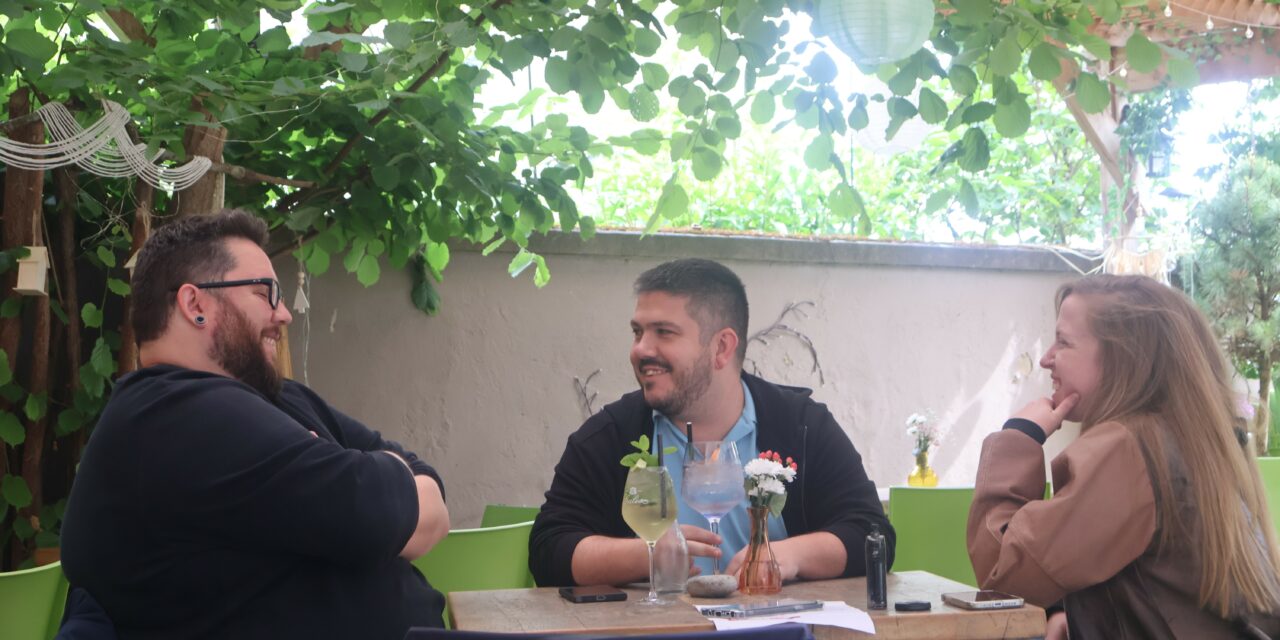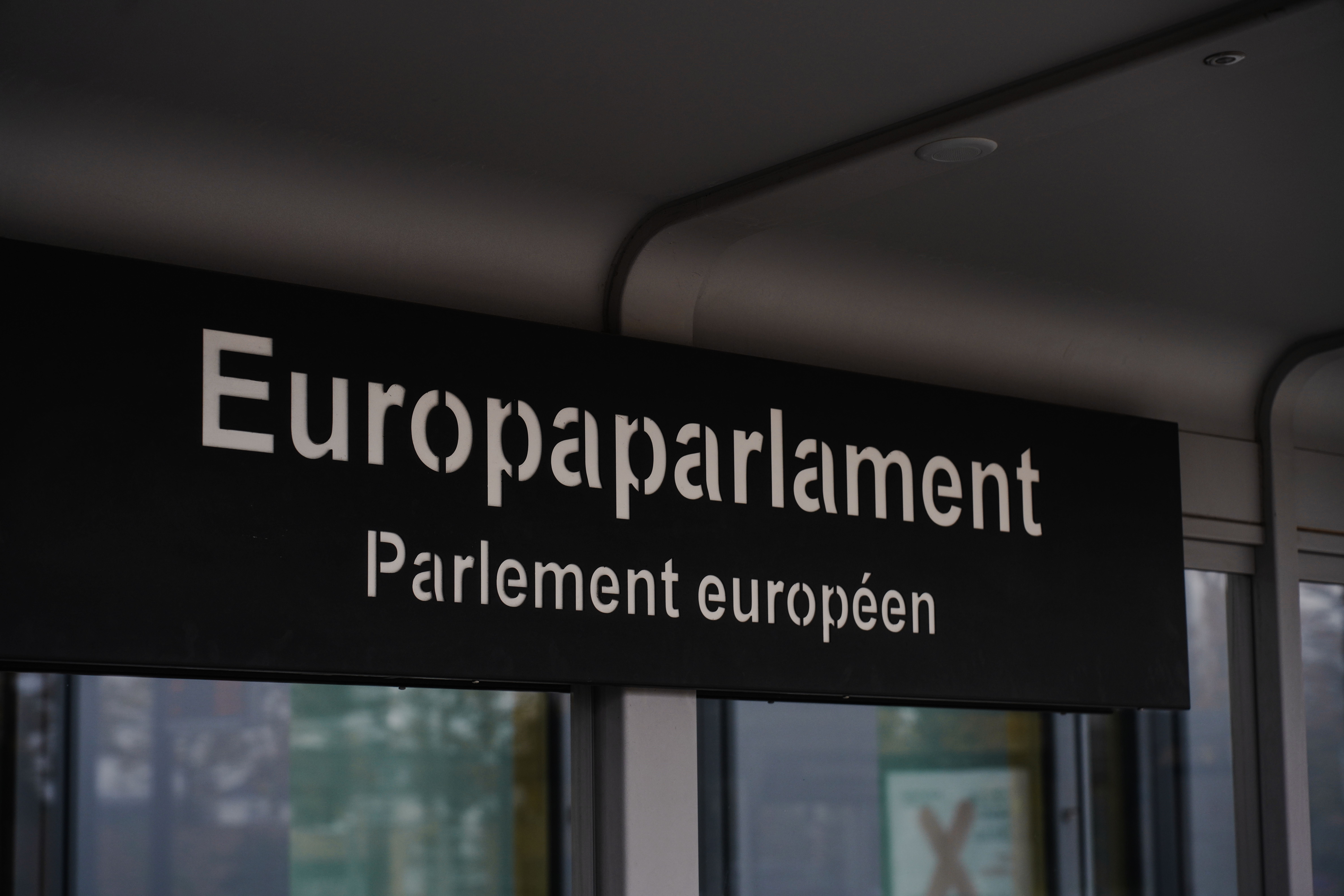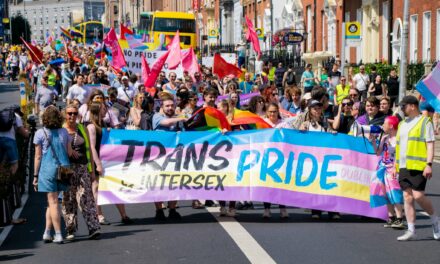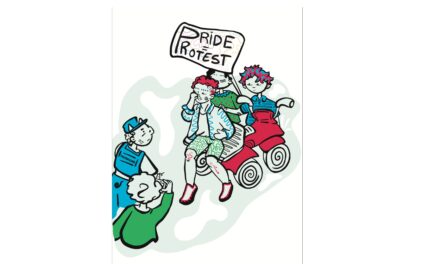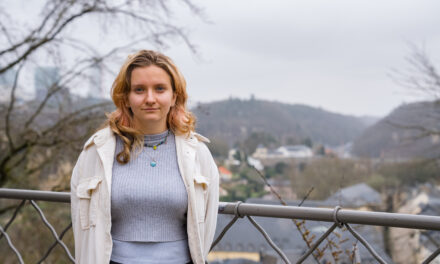Luxembourg’s 2024 Pride Festival Week will take place in the city of Esch, south of the Grand Duchy from 6 to 14 July. It marks the country’s 25th, and will be the crowning event of Pride Month, a month of cultural, social and political events and acts of LGBTIQ+ visibility. queer.lu sat down with members of the Pride Organizing Committee, Laurent Boquet, Andy Maar, and Tania Whitehouse, to get a firsthand account of what’s in store for visitors this year and learn more about their decade-long commitment to organizing Pride in Luxembourg.
queer.lu: What does Pride Week mean to you, and is Pride still relevant nowadays? Tania, if you could start, as the youngest member on Rosa’s board of directors.
Tania Whitehouse: Before joining Rosa, I was very much in my queer bubble, hoping that positive change for LGBTIQ+ Individuals was inevitable, but I now realize that people are not as accepting of our hard-fought rights as you’d hope them would be, particularly the younger generation who seem to be under the spell of extreme ideas and ideologies. To me, pride this year means being proud of who you are and not feeling any shame. It’s about sharing love and sharing support and fighting for more rights and for equality but also about acknowledging that sometimes equity and equality are not the same things.
Laurent Boquet: When Pride picked up, it was mainly a revolt against oppression, and in particular, police repression. We have come a long way since then and although we are no longer fighting off the police for our right to hold peaceful protests, there still is a lot to do for the community but we take pride in the fact that our marches today comprise openly queer police. As to the importance or relevance of Pride today, we all agree that Pride is still vital in Luxembourg. We continue to fight for our political demands, which range from the ban on conversion therapy, gender recognition, especially the breaking down of the binary gender system in identity documents, to the fight against all forms of discrimination in the workplace and against hate crimes against LGBTIQ+ people. Since I’ve been part of the Pride organization, I’ve never felt the need to go out on the streets to demonstrate for our rights as this year, because I am very concerned about the rise of the far right across Europe in the last European election.
Andy Maar: As my colleagues mentioned, we are all faced with rising threats from conservative forces across Europe, even in Luxembourg, where the far right has won a seat to the EU parliament in the last election. It is clear that these forces are bent on rolling back our hard-fought rights as an LGBTIQ+ community and we should not let that happen.
queer.lu: Give us a brief outline of Pride in Luxembourg
Andy Maar: Pride was first held in Luxembourg City in 1999. It was known as “Gay Mat”, and evolved from an action day with information stands to a street festival on the Place d’Armes in the centre of the capital. When I joined the organising working group in 2009, we quickly realised that a considerable part of the community wanted more activities. So from 2010 onwards, we tried to give many aspects of queer culture a platform at Pride without neglecting the basic political message. Movie nights, discussion panels and exhibitions soon rounded off the programme.
queer.lu: Laurent, is Pride still a political protest, or has it become an opportunity for politicians to boost their image and lure LGBT votes?
Laurent Boquet: Politics is still at the core of Pride Week Fest, that is why the first Pride truck has always been the one carrying our political demands. As for the presence of politicians, whether through stands representing their parties or in their capacity as private individuals, Rosa Lëtzebuerg can only welcome everyone. In my opinion, it is not only the politicians’ right but even their duty to face the queer community at this event. We are aware that some in the community may object to this, but for me, it is very important that Pride Week remains an opportunity for LGBTIQ+ individuals to have direct access to politicians, to exchange with them and tell them what’s on their minds.
queer.lu: So what message do you have for politicians this year?
Andy Maar: Exactly, at Pride everyone has the opportunity to address politicians and parties about their work. This is the only way to enter into a constructive dialogue and the only way for the demands of the community to be recognised and understood. Regarding our demands, we have decided to keep the same set of demands as last year. These are still the most urgent at the moment and as nothing has changed at legislative level since last year, it is now even more important to remind those responsible, some of whom are new, of the community’s demands.
Laurent Boquet: We have been holding talks with various ministers lately, to advocate for our rights, and remind them of our demands. Although some in the community argue that election season is behind us and that most politicians feel less pressure from constituents, the Ministers of Health and for Gender Equality and Diversity have pledged to show up for Pride in order to meet with the community.
queer.lu: Tania, could you talk about safety during Pride. Do you personally feel safe as a queer individual attending the festival?
Tania Whitehouse: I would say that I do not feel unsafe at Luxembourg’s Pride. I’ve been to many Pride festivals where I may have felt less safe. I believe the safety protocol in place during Pride in Luxembourg is pretty safe. And as Pride organizers, we work in close coordination with multiple partners to make sure the festival is safe, be they police force, emergency and first aid or trained security staff.
queer.lu: Andy, Laurent, talk about the safety protocol in place?
Andy Maar: First, as a member of the European Pride Organisers Association (EPOA), Rosa Lëtzebuerg is particularly sensitive to the issue of safety and security. We take part in annual training and workshops about the safety of attendees and visitors. Laurent can further expand on the safety measures.
Laurent Boquet: Pride is a major event in Luxembourg, and as such, may constitute a high safety risk event so we must abide by very strict measures. Every year, we hold a meeting with the Police Department to clarify when and where it is important to have a police presence. For example, the interfaith ceremony, which hosts representatives from the Jewish, Christian and Muslim religions, has always been held with beefed-up police presence. During the street fest, we have first-aid and emergency teams, as well as an ambulance on site. Besides, we work with a private security firm, which gets special training for the festival from our team. It regularly patrols all private and public areas around the main stage in Esch. As regards the safety during the Pride March, we ask each participant to recognize a safety reference person for the truck or group of pedestrian block they are walking with, and to immediately refer to that person when necessary. Besides, we give each and every participating individual or group a safety training the day we draw the lottery to determine the starting order of the march.
queer.lu: Let us stay with the Pride March. Tania, there are many companies taking part in the Pride March each year. How do you feel about the corporate aspect of Pride? How do you ensure these brands are authentically inclusive when they join/sponsor Pride celebrations, and are there any mechanisms in place to vet how they behave with their LGBT+ employees and partners?
Tania Whitehouse: That’s a pretty tough subject. Pride is a big and costly event and like all big events it’s sometimes difficult to work with sponsors. As organizers we are always in a balancing act between ensuring the solvency and continuity of Pride as a big event for the community and the vetting processes of corporations and brands which take part in the Pride march. Laurent and Andy will expand on this issue but I would like to point out that our work as members of Rosa Lëtzebuerg asbl, including members of the board, is pro bono.
Laurent Boquet: I confirm what Tania has just said about the voluntary nature of our work as members of Rosa Lëtzebuerg asbl. To thank our members for the selfless dedication, Rosa Lëtzebuerg asbl covers basic needs for the organization team, like their meals and drinks during Pride. Let me go back to the financial cost of Pride. It is estimated that Pride Week Fest cost around 250 000 euros. Half of the budget is covered by the City of Esch as host of the event. The Ministry for Gender Equality contributes 5% and we raise the rest of the funding through sponsoring. So as you can see, much of the funding is public money. Besides, we have fairly clear conditions for the corporation looking to join Pride. We have the Rainbow Business Owner Network, managed by Rosa Lëtzebuerg. To access this package, you have to be a member of this network. So, in order for a sponsor to join Pride, you have, for example, to be a signatory of the Diversity Charter. We turned down several sponsors this year, either because they didn’t meet our conditions, or because they hadn’t signed the charter.
queer.lu: Tell us about the Pride theme this year, and the much anticipated entertainment line-up.
Andy Maar: Our Pride Theme this year is “Together in Unity, Proud in Diversity”. It reflects the need for our community to come together, more than any other time, and show that we are united in our diversity. So, we call on all our LGBTIQ+ sisters, brothers, siblings and allies to come together. The Pride Week Fest will culminate with the Pride march and the Street Festival in the city of Esch as you mentioned. This year’s line-up includes Conchita Wurst, Bilal Hassani, Gustaph, Alessandra, Madame Yoko among many other talented DJs, performers and artists.
queer.lu: Talk about your favorite Pride campaign over the last decade and tell us why?
Tania Whitehouse: 2023 was the most impactful year. That year I had my first hands on experience with the Pride organization and I learned a lot about how to manage time and effort and realized how much work the whole organization entails. I was obviously physically drained by the end of the event because the weather was very hot and I worked between different Pride spots, helping colleagues tending to visitors. It was an emotionally charged event but I enjoyed every bit of it. Obviously, we could do better with more volunteers, so I am making a call for all those who wish to join our team to do so.
queer.lu: How about you Laurent, Andy?
Laurent Boquet: Pride is a collective effort. It’s not only the few dedicated people in Rosa who make it a successful event each year. It’s the community at large. We really try to include as many people as possible. We may come about as a closeted working group, but we are genuinely open to everyone, members and non-members alike. We’re open and we’d love anyone who feels comfortable with organizing this event to join us. So, my turn to extend an invitation, just like Tania.
Now, to your question about my best Pride: I’ve been on the organizing committee for 16 years. Every year has been better than the previous one. The first Pride was called “Gay matt, och fir eis” (Come with Us, Also Come for Us) and was about marriage equality. It felt great to see that our efforts paid off five years later when same sex marriage was adopted by law. In the meantime, our team got to know one another, we built friendships and became a family.
Andy Maar: I‘ve had three impactful experiences with Pride: the first was in 2019, when we held the Equality March in the city of Esch. We had concerns about public turnout and were positively surprised to see that there were so many people in the main square that the parade, with its trucks and marchers, had a hard time making it to the main square. The 2020 edition was also very emotional for me, despite it being mainly online due to the Covid pandemic. To me, it turned out to be the purest form of a Pride. It was entirely organized remotely by so many different members from our communities, and the “Digital Equality March” was made by people who put in so much effort while still in quarantine. My last memorable Pride was in 2022, and the unforgettable expression I saw on the face of a young person on the city hall square in Esch. He was barely around 16 and had the rainbow flag painted all over his face and donned a rainbow flag for a cap. His happiness and energy radiated through the whole place.
Queer.lu: to wrap this interview up, I’d like to know how you view Pride, as protest or a celebration?
Tania Whitehouse: I do not think you can separate one from the other. It’s a celebration of who we are as individuals, and as a community and it’s a protest against all those bent on stopping us, on preventing us from being who we are.
Laurent Boquet: We’ve had quite a few Pride editions since I joined the organizing committee. We celebrated and we protested in each one of them. We fought for marriage equality, and marriage equality we got when the Chamber of Deputies passed the marriage equality act years later. So to me Pride is both: Celebrating and protesting. They go hand in hand.
Andy Maar: I think it has to be both at the same time. I remember the first Pride Festivals we organized. It was really difficult back then to find artists and performers who dared to go on stage to celebrate Pride. Today, we have a waiting list of people who wish to perform during Pride, which, in turn, has become the celebratory cultural event, par excellence, for LGBTIQ+ people in Luxembourg. On the other hand, Pride remains a political protest because it is the most opportune event to voice our political demands as a community.
Queer.lu: Well, thank you everyone for your time and insight.
Photo: Kusaï Kedri
